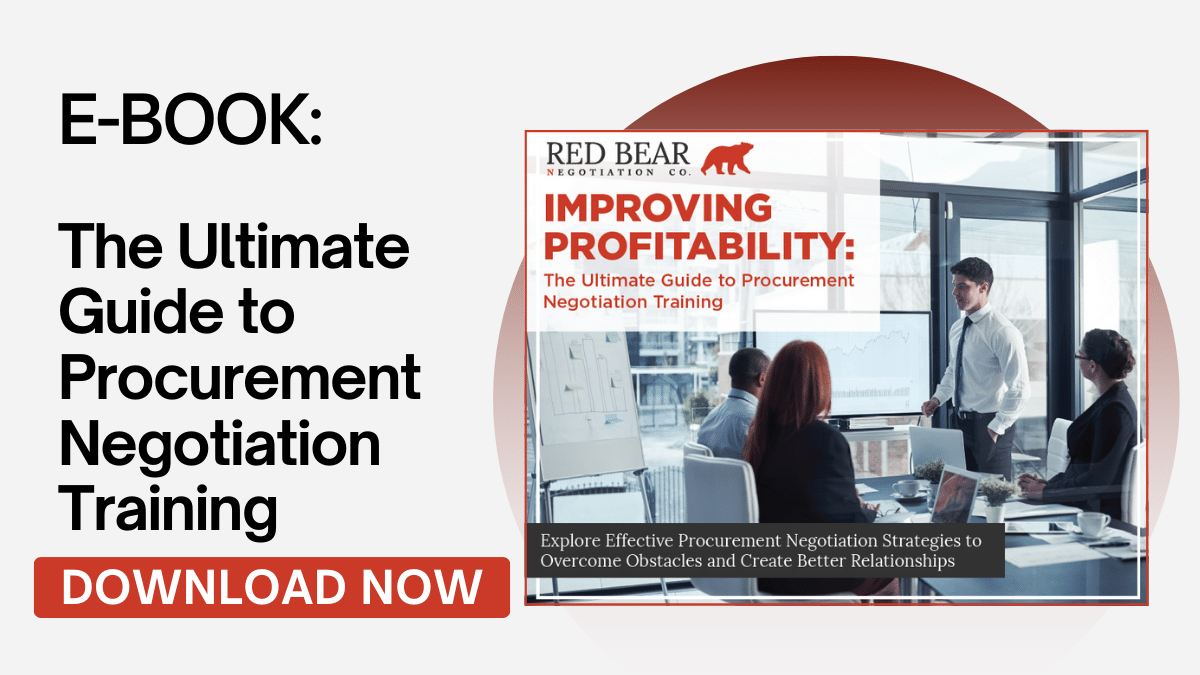When it comes to procurement negotiation strategies, you’ll find that every training company and procurement team has its own take on what success looks like. But, at the end of the day, if your business goals revolve around building strong relationships and creating value, you’ll need to focus on crafting win-win outcomes that satisfy both parties' needs.
How can procurement professionals master the craft of negotiation? What strategies fall short, and which ones drive optimized outcomes?
Here at RED BEAR, we teach a procurement negotiation methodology that gets results. It's not about one-time use tactics or manipulative strategies; it’s about finding a balance between the initial instinct of self-interest and the desire to collaborate and develop mutually beneficial proposals.
That’s why our training is utilized by over 45% of the Fortune 500.
Let’s dive into a few core concepts that drive RED BEAR’s approach to procurement negotiation, including creating standards around the negotiation process, building influence, and, of course, focusing on win-win outcomes.
Why Win-Win Outcomes Should be a Top Priority
It’s easy to think negotiation is all about getting what your side wants. In fact, for most novice negotiators, this is the most apparent goal. But, when you see this purely self-interested approach in action, it rarely gets the results you want.
Of course, those initial feelings of self-interest shouldn’t be overlooked — far from it. What expert negotiators do is balance that self-interest with a collaborative approach that unlocks the creative potential of mutual problem-solving.
“What expert negotiators do is balance that self-interest with a collaborative approach that unlocks the creative potential of mutual problem-solving.”
This is a concept we’ve explored in depth in other articles.
When procurement teams can master this balance, they can build stronger relationships with suppliers, satisfy needs over wants, and create value in virtually any negotiation environment.
It all starts with a renewed approach to negotiation that puts an emphasis on win-win outcomes.
What Happens When Teams Focus on Maximizing Outcomes
Value is much more than price.
Getting creative and finding other non-transactional negotiables can unlock better delivery schedules, reliability in supply, exclusive access, and greater supplier collaboration. When companies develop strong supplier collaboration capabilities, they beat the industry standard for growth by around 2x.
With the right approach to procurement negotiation strategies, businesses can move past what appears at first glance to be the primary negotiable, which is often money, and uncover the underlying needs behind a want.
As we touched on before, success looks different for every organization and for every individual.
By focusing on maximizing the outcomes for both parties, procurement professionals can learn to discover alternate negotiables as well as elegant negotiables — which are alternate negotiables that cost little but carry a big impact.
Here’s an example: let’s say a supplier is dead set on a higher price for materials. At first, this can seem like a simple need, which is more money. But, if you dig deeper, you might find that they’ve had bad relationships in the past where clients left them in the lurch when they canceled orders time and time again, making this higher price an attempt to secure more profits in the short-term to mitigate the threat of lost profits in the future.
When negotiators try to uncover these underlying needs and craft deals that maximize the outcome for both parties, they might offer assurances on material orders throughout the year at a lower price. In this situation, everyone leaves happy. The supplier gets a steady stream of orders in their pipeline, and the company gets a better deal in the long run.
Standardizing the Negotiation Process
Prioritizing win-win outcomes is a mindset shift. But what about the nuts and bolts of procurement negotiation?
At RED BEAR, we highlight the importance of standards around the negotiation process. Businesses can’t just lean on the few individuals with the innate ability to negotiate effectively; they need to empower everyone on their team to find success. Here, the right process makes all the difference.
With a standard negotiation process in place, everyone involved in negotiations can have more clarity, efficiency, and effectiveness. Without these standards in place, your team will walk into every negotiation without the tools they need to succeed, starting from scratch each time. As you can imagine, this isn't only stressful but also very ineffective. Moreover, when businesses put a focus on streamlining their internal processes, they often see a rate of return better than 15% for each project.
Good negotiation planning is a two-phase process. It starts with the research phase.
This phase is all about objective preparation. Here, procurement professionals will gather facts, run numbers, and get approvals.
Next is the anticipation phase, which involves subjective preparation. It’s all about putting yourself in the other party’s shoes. What kind of pressures are they under? What are some difficult questions they might ask?
These queries will help your team understand the other side and come prepared for anything. From here, teams will create an action plan, work through negotiation analysis, set terms, develop a concessions strategy, craft a positioning statement, and much more.
During the actual negotiation, this planning and preparation will prove immensely valuable.
Of course, it’s more than just a plan that gets results. Businesses also need to develop standards around training and terminology to ensure everyone is on the same page.
Luckily, through RED BEAR’s Procurement Negotiation training, your team will learn the skills, get the tools, and acquire the knowledge needed to craft an effective negotiation process and plan to negotiate no matter where the discussion takes place and who you’re talking to.
Building Influence in Any Procurement Negotiation Scenario
Influence is a powerful concept. Whether your team is consciously trying to influence the other party or not, it’s happening. But how can individuals wield influence appropriately?
Well, if you’re following a standard process around negotiation and focusing on finding solutions that benefit both sides, influence will become a byproduct of effective negotiations.
We all have seen a lack of professionalism in action. This lack of care speaks volumes, and when negotiators enter a discussion without the right plan or knowledge, they can send a clear message to the other side that they simply don’t care enough to put the time and effort into the client or supplier.
By simply coming prepared and showing you care about how the other party feels at the end of the negotiation, you can position your business for success. Of course, that’s only scratching the surface. Knowing the full range and strength of your power means understanding the 6 sources of power in any negotiation. These include:
- Situational power
- Knowledge of the other party
- Informational power
- Organizational power
- Personal power
- Planning power
When negotiators understand each of these sources of power, they can wield influence not only effectively but responsibly, leading to win-win outcomes and long-term value in relationships.
Discover the RED BEAR Edge
These are just a few of the procurement negotiation strategies you’ll learn in RED BEAR’s Procurement Negotiation training workshops. Our goal is to transform individuals into world-class negotiators with the skills, tools, and behaviors they need to craft profitable, value-based agreements with suppliers.
With nearly 70% of a company’s revenues going back to its suppliers, even a 1% reduction in costs can increase profits by more than 4%. That’s the power of effective negotiation training; that’s the power of RED BEAR.
Want more proof that RED BEAR’s training gets results? For every $1 invested into our workshops, our clients receive, on average, $54 back.
Ready to get started training your team on the same negotiation methodology used by Fortune 500 companies? Get in touch with the team today to learn more about your options.
Fill out our contact form and we will be back to you in no later than one business day.





